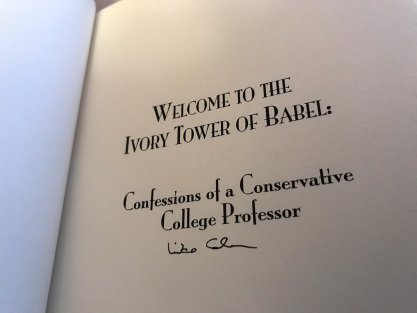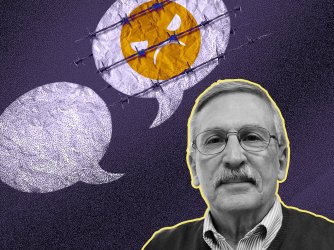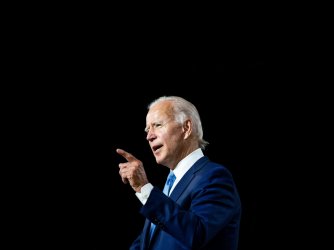Table of Contents
Professor Mike Adams’ suicide will always haunt me

Mike S. Adams (Bruce Ellefson/Facebook)
It's been more than five months since former University of North Carolina Wilmington professor Mike Adams killed himself after being pushed into early retirement for offensive tweets. My friend David French and my colleague Robert Shibley already wrote powerful articles about it, but I knew eventually I needed to say my piece.

I first met Mike Adams back in 2001, when he was under investigation for responding dismissively to a student who was, as Mike summarized later, “blaming the 9/11 attacks on the United States Government,” all while the rubble was literally still smoking.
At the time, I was brand-new to FIRE.
Mike and I spoke on the phone many times as his case progressed. During one conversation, I mentioned to him that I was reading Lenny Bruce’s book “How to Talk Dirty and Influence People.” Mike later told me he had read the book at my recommendation, thought it was extremely funny, and explained that it inspired him to reshape his approach to how he would battle for his conservative beliefs: He would develop a more irreverent, jokey, but also in-your-face style, in the tradition of the proto-“shock jock,” Lenny Bruce.
For my entire life, the role of the “provocateur” — the gadfly who pokes at society in an outrageous way quite specifically to produce a reaction — was considered a legitimate, even necessary (if not always well-liked) societal role. It was believed that provocateurs, comedians, and edgy social commentators helped keep society from becoming too complacent, too self-certain, or even too partisan. The tamer cousin of the provocateur, the edgy social political commentator, went through a kind of golden age in the 2000s in the forms of Jon Stewart, Dave Chapelle, Bill Maher, Dennis Miller, and Stephen Colbert, who launched his show with a character based on popular edgy conservative commentator Bill O’Reilly. It wasn’t everyone’s cup of tea, but it was a style that was recognized, understood, and even respected.
While my colleague Robert Shibley showed us all how to write a proper eulogy for someone without feeling the need to identify them as “controversial” or “divisive,” I cannot be quite so classy. I confess that Mike’s new style often offended me. I found myself cringing when I read his columns, or even just their titles, and more than once thought to myself: “I created a monster.”
Partially because of his role as a provocateur at UNCW, I had lots of reasons to stay in touch with Mike over the years. He liked to tease me for being a liberal, but he had tremendous respect for FIRE’s genuinely nonpartisan work and our dogged defense of professors’ and students’ free speech rights. Despite his political persona, Mike in person could be a very warm guy: self-deprecating, funny, friendly, but with the kind of self-assurance that led me, tragically, to think he’d be fine no matter what curveballs life threw at him. We were never close, but I did think of him as a friend.
It is a sad testament to our times that admitting that I considered Mike a friend is likely to make me “morally polluted” in some circles, a term Pamela Paresky explained in a recent post. For most of my life, there was nothing all that odd about a liberal having a right-wing friend. Hell, my much beloved “Hipster Handbook,” which came out in 2003, assumed that even hipsters were assumed to have at least one token “Republican friend.” But society has sorted itself so much recently that such friendships are increasingly rare.
David French told much of Mike Adams’ history with FIRE in his wonderful eulogy, and I shared those experiences. Based on Mike’s edgy commentary and the personality conflicts with his progressive co-workers that arose from it, he was denied tenure in 2006. It would take seven years and the U.S. Court of Appeals for the Fourth Circuit for that retaliatory denial to be reversed.
Indeed, professors across the country owe Mike a debt of gratitude. For most public employees, the general rule (which comes from the Supreme Court case Garcetti v. Ceballos) is that the First Amendment does not protect public employees from discipline based on speech related to their official duties. Adams v. University of North Carolina-Wilmington was the first federal appellate case to actually hold that the First Amendment interest in academic freedom overrides that general rule. Honestly, I thought his lawsuit was going to go down in flames. I’ve rarely been so happy to be so wrong. But despite this stunning victory, we still often had to hop on the phone to talk about the latest threat to his or his friends’ careers.
Mike’s forced early retirement in June came at the beginning of a huge explosion of FIRE cases on a scale never before seen in FIRE’s history. Since much less controversial figures than Mike were finding themselves “canceled,” there was little doubt people would use this opportunity to come for him. And sure enough, students started once again calling for his termination after Mike posted a tweet addressing state governor Roy Cooper that compared North Carolina’s COVID-19 restrictions to slavery, writing “Massa Cooper, let my people go!”And once you transgress, you can be unpersoned into a caricature of societal evil, an object of scorn — no longer a real person, but an evil abstraction, sometimes a laughable cautionary tale. It’s a nasty paranoid lonely little universe
Mike’s situation was a textbook cancellation: It was focused, intense, and demanded immediate termination. UNCW extended the olive branch of early retirement in order to avoid the inevitable litigation that would follow an outright termination. On June 29, UNCW announced on Facebook that Adams would retire, effective August 1. That announcement triggered additional rage-filled responses, because Adams would receive a settlement of over $500,000 (which, given he had at least 10 more years to his career before normal retirement age, was a comparatively small amount).
UNCW’s chancellor would defend the settlement on July 2, arguing that the last lawsuit UNCW incurred for unconstitutionally punishing Adams’ freedom of expression — the tenure fight — cost roughly $700,000. For a school that desperately wanted to be rid of someone who was in his third decade of starting trouble at UNCW, a few hundred thousand dollars was a bargain.
I wrote to Mike on June 30, when I saw a report of the settlement, just to see if he was okay. I actually deluded myself into believing that Mike was likely quite happy with the settlement. He mentioned wanting to retire early to me once before.
Mike and I finally spoke over the phone on July 13. He was shaken and upset in a way I’d never heard him before. He related how nastily he was being treated. He told me stories of angry phone calls and emails he received. They included messages claiming his wife and children were seen at Black Lives Matter rallies performing sex acts on black men. This struck me as bizarre, not only because Mike didn’t have a wife or kids, but because these taunts came from people motivated by their supposed sensitivity (and Mike’s supposed insensitivity) to social and racial justice.
We discovered later that he even filed a criminal complaint against one of the people who sent him threatening and harassing messages. That really struck me. Mike was used to enduring a seemingly limitless amount of abuse. It would take a great deal to cross the line into something he thought required reporting to the police. He told me he thought the hatred for him was ironic, as he was horrified by what happened to George Floyd in May, and he wanted police to be held accountable and reformed.

Mike asked me if he had any legal recourse against the university. I told him not much, given that he’d already agreed to the severance package. As for a potential defamation case, those are something that FIRE doesn’t do on principle and, regardless, they are very hard cases to win. I did, however, put him in touch with one of the best First Amendment lawyers I knew to see what his options were. My last email to him read: “Good luck, sorry it took so long, please keep me updated.”
He never called the attorney, and I never spoke to him again. He was found alone in his house on July 23 with a self-inflicted gunshot wound to the head. Mike Adams was 55.
Culture war influenced depression
His suicide stunned all of us at FIRE. The guilt began to wrap its way around my chest. I should’ve called him as soon as I heard anything about his case. I should’ve gotten him a lawyer sooner, while one still might’ve made a difference. I shouldn’t have been so dismissive of his legal options. I should’ve discouraged him from following the path of the provocateur. I should’ve reminded him how Lenny Bruce ended up: dead from an overdose at the age of 40 while fighting in court to defend his right to free speech.
And most of all, I should’ve understood the psychological freefall he was in, because I had been there myself. As I revealed in “The Coddling of the American Mind,” in more detail than I had ever even shared with even my wife or loved ones, I came very close to killing myself in 2007 during an especially severe bout of depression. One thing I didn’t stress in the book, though, was how much of this depression was related to my job and the culture war.
For those of you who’ve never been in the middle of the battle between the worst of the ideological left and the worst of the ideological right, I can tell you it really gets inside your head. You get to see people on both sides go from loving you to hating you depending on who you defend, even if the moral principles of the case are identical.
I’ve seen people turn on professors and students that were once their friends and treat them as if they’d transformed into immoral monsters, deserving of only banishment or worse. I’ve felt that directed at me, my co-workers, and my friends. It creates a paranoia that everything can be stripped away from you if you make one wrong move, one wrong comment, one wrong joke. And once you transgress, you can be unpersoned into a caricature of societal evil, an object of scorn — no longer a real person, but an evil abstraction, sometimes a laughable cautionary tale. It’s a nasty paranoid lonely little universe, and back in 2007, I felt like I was alone there.
I’ve seen others like me caught in the middle of the culture war have breakdowns and be hospitalized. There was at least one other suicide where I believe the exhaustion of the culture war played a role. As readers of “Coddling” know, I am critical of the way I think the campus culture war teaches young people to think. I believe we are teaching a generation the mental habits of anxious and depressed people. But I also think a constant battle at such a high emotional pitch takes its toll on those of us who oppose it, as well.
But I never thought Mike was one of those people. He just seemed so supremely confident. You couldn’t talk to Mike without thinking he was going to be fine, no matter what. And I was horribly wrong.
I have taken some nasty comments, even from people I love, for saying that I considered Mike my friend. We agreed on almost nothing. We didn't agree on politics, to be sure. His point of view and his style couldn't be farther from my own. But that style was no more offensive or insensitive than what you would've heard on Howard Stern growing up, or even on “Family Guy” 10 years ago. And, most of all: Do we really care that much about this? He was a person, and he's gone now, and I believe that, without the canceling, he'd still be with us.
There’s something very sad about that.
The culture war is supposed to be a war in metaphor only. Even in war, people often express sadness or remorse for the death of people “on the other side.” In Mike’s case, the inhumanity shown to him and his friends started with some of the reporters covering his death and extended downward. I will refrain from linking to some of the hundreds of absolutely ghoulish tweets gloating about his death, but they weigh heavy on my heart.
For us at FIRE, it is something like a punch in the face that stuns you back into reality, a reminder of how important our work is, and how crucial it is for us to remember that behind all of these ridiculous, even sometimes seemingly amusing, stories is a real person who may be suffering well beyond anything we could've guessed. Those of us who knew Mike, and those who didn't, are reminded that these "campus horror stories" are not cute, silly, or trivial. For those who are vulnerable, they can quite literally be a matter of life and death.
Recent Articles
FIRE’s award-winning Newsdesk covers the free speech news you need to stay informed.

Should the First Amendment protect hate speech?
In America, hate speech is generally protected by the First Amendment. But should it be?

Here’s what students need to know about protesting on campus right now

FIRE joins animal advocates, free speech groups urging Ninth Circuit to affirm ruling that allows undercover audio recording
